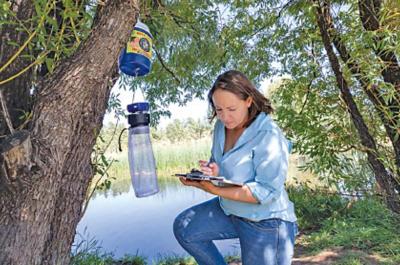As Scottsdale and the rest of the nation struggle with the ongoing menace of COVID-19, another public health danger is becoming a bigger threat here.
West Nile virus – long considered a permanent public health threat in the Valley and Arizona – has become particularly menacing as a result of last month’s heavy rains.
The mosquito-borne threat already has hit home in parts of the Valley. In Ahwatukee, two residents between the ages of 40 and 60 from different households were hospitalized. While one has been discharged, the other has been moved to a rehab facility.
TV Channel 3 broadcast a report on a Peoria man who is in the hospitalized paralyzed by the disease and the Maricopa County Department of Public Health announced that West Nile Virus has claimed its first life of the season.
“We all need to do our part to protect ourselves, our family and our neighborhoods from mosquito-borne diseases,” said Dr. Rebecca Sunenshine, medical director of the Disease Control Division at Maricopa County Department of Public Health. “With so much rain this summer, we all need to stay mindful of eliminating standing water where mosquitos can breed, like pet dishes, potted plants, and even toys.”
She reported that 36 human cases of West Nile Virus have been reported so far this year – a sharp increase over the three cases reported last year that resulted in one death.
“This is a significant increase in cases,” the department said. “The individual who died was an older adult who also had other health conditions. While adults over 60 and those with chronic health conditions are most at risk for serious complications of West Nile virus, young healthy individuals can also get severe disease.
The Maricopa County Environmental Services Department, which conducts aggressive year-round mosquito surveillance and abatement programs, reported a nearly 400 percent increase in positive West Nile virus mosquito samples compared to all of last year.
The Arizona Department of Health Services last Friday reported two deaths statewide so far this year and a total 451 cases of severe illness.
West Nile virus can cause severe disease, though only about one in five of those infected will develop any symptoms at all.
Animals, particularly horses, also can be sickened by infected mosquitoes.
Maricopa County conducts fogging operations to combat mosquitoes and its most recent map shows where they have been launched. Go to maricopa.maps.arcgis.com/apps/webappviewer/index.html?id=c00b3ecbb3344ca2930a30b978184ddd. A calendar of fogging operations is at maricopa.gov/calendar.aspx?CID=51.
For other information about West Nile Virus: maricopa.gov/2423/Fight-the-Bite. ν








